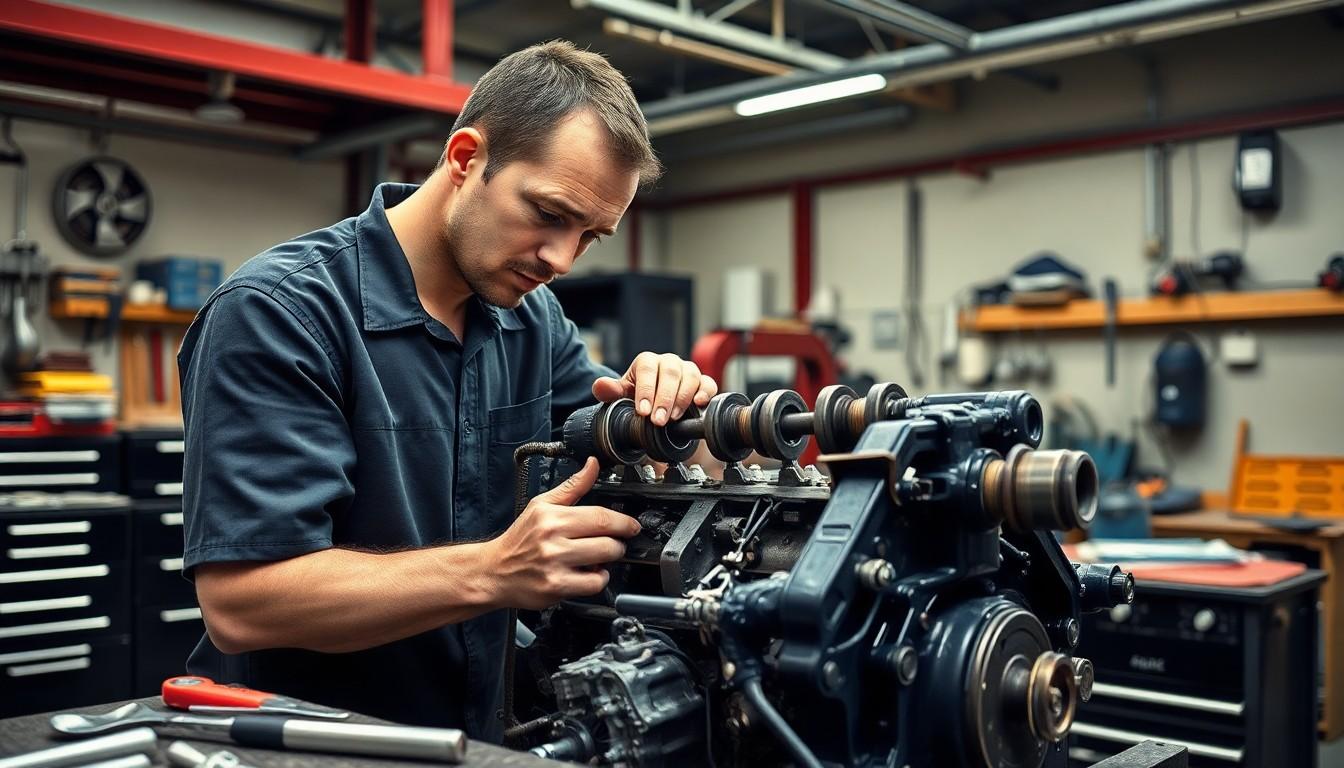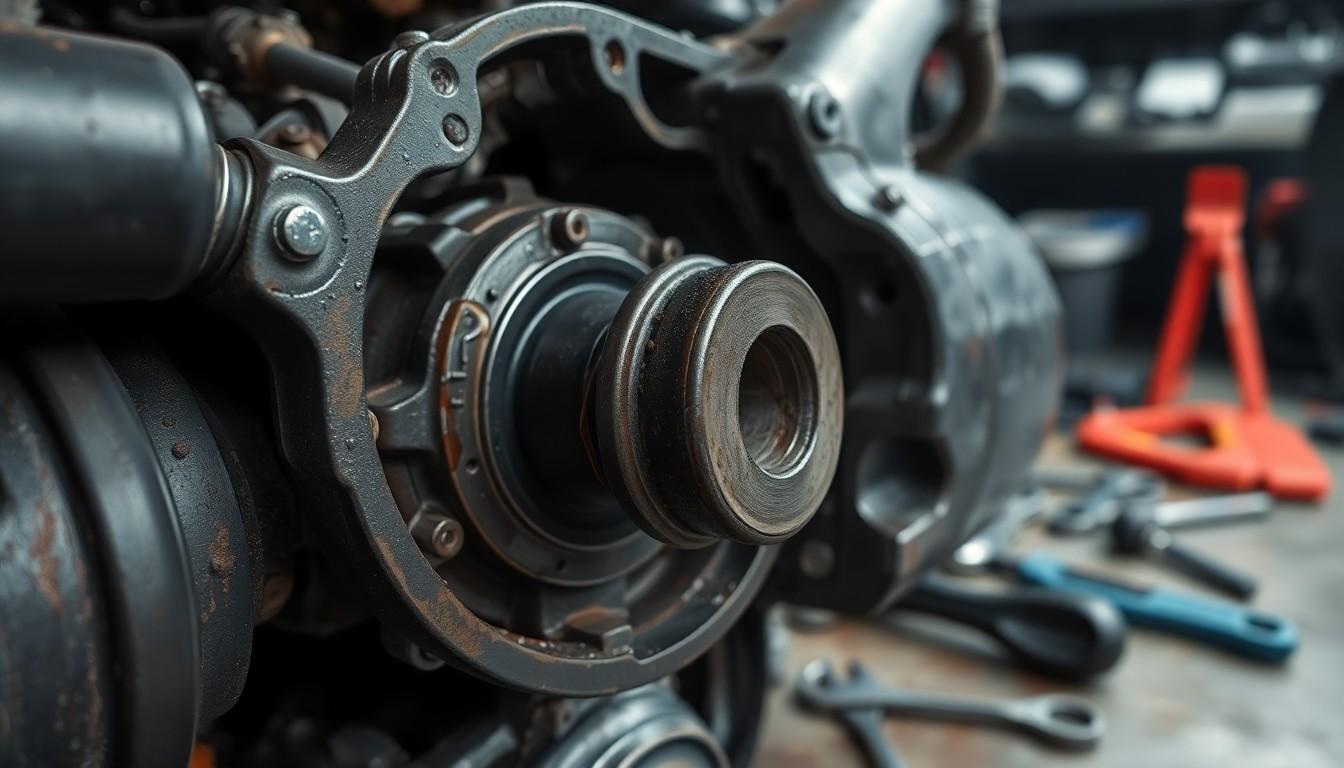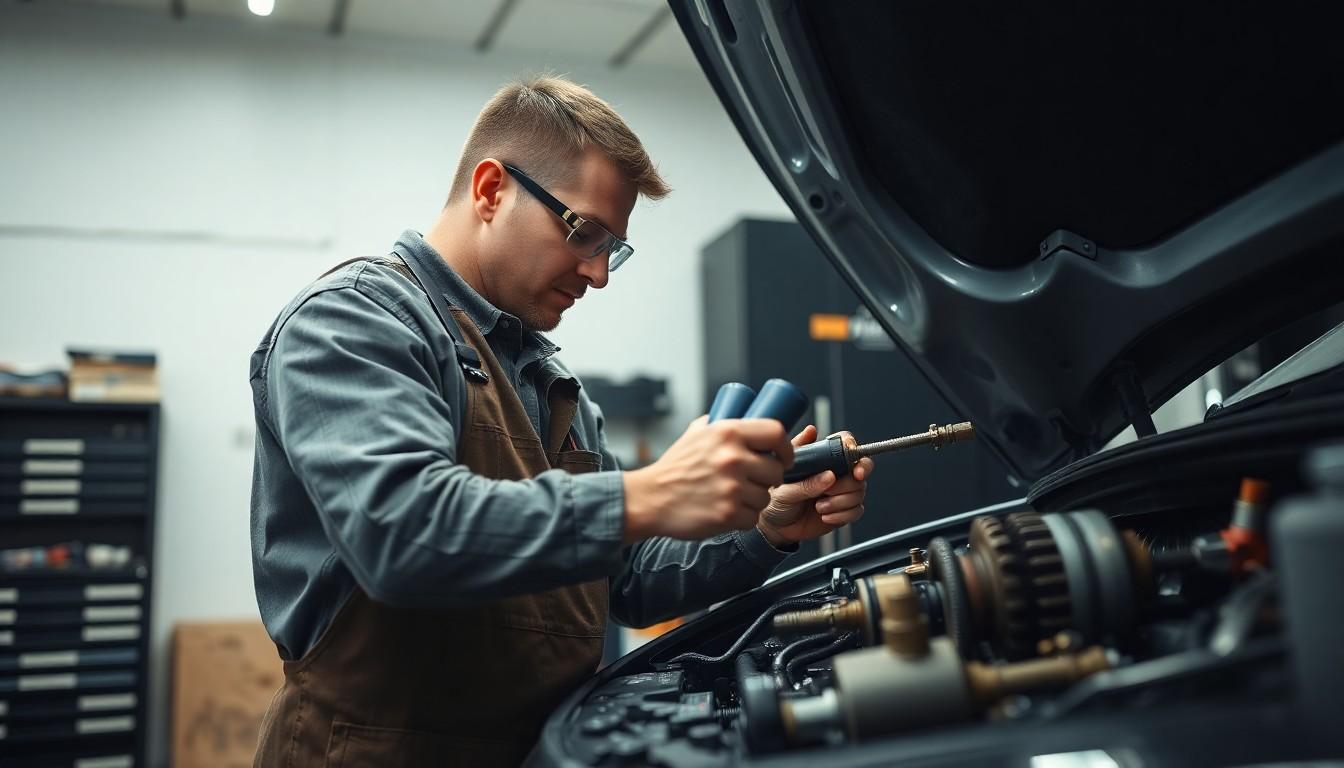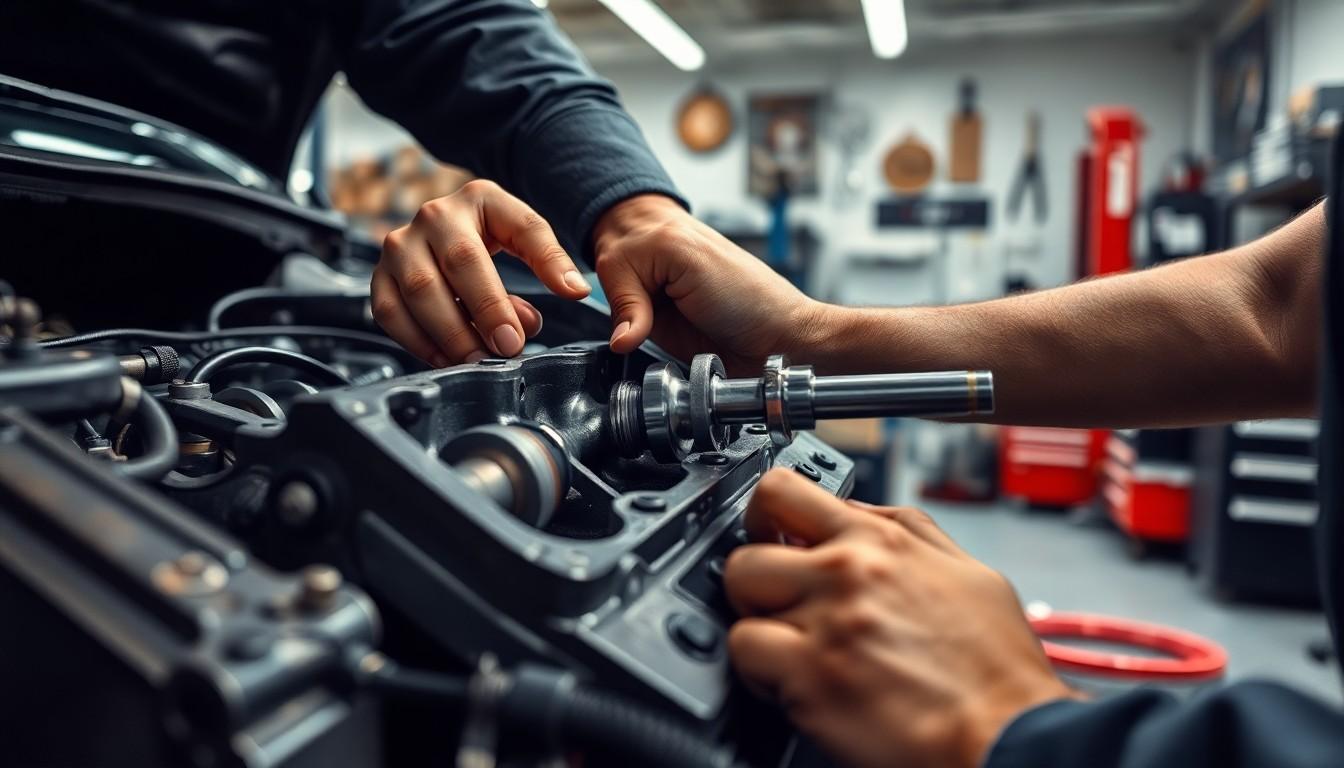When your engine starts making unusual noises or performance drops significantly, a faulty camshaft might be the culprit. This critical component controls the timing of your engine’s valves, directly impacting your vehicle’s power and efficiency. But what happens when it needs replacement?
We understand the stress of unexpected car repairs, especially when they involve complex engine components. Camshaft replacement costs can vary dramatically based on your vehicle’s make, model, and whether you choose DIY or professional installation. In this comprehensive guide, we’ll break down all the factors affecting camshaft replacement expenses, helping you prepare for this important repair without very costly.
Understanding the Camshaft and Its Functions
The camshaft serves as a critical component within your vehicle’s engine, controlling the opening and closing of intake and exhaust valves with precision. Located either in the engine block or cylinder head, depending on your engine design, this rotating shaft features carefully designed lobes or cams that push against valve lifters during operation. Each revolution of the camshaft transforms the engine’s rotational motion into the linear movement needed to operate the valves.
Modern engines often employ multiple camshafts, with dual overhead cam (DOHC) systems using separate shafts for intake and exhaust valves. This sophisticated arrangement allows for more precise valve timing and improved engine breathing, resulting in better performance and efficiency. Variable valve timing systems add another layer of complexity, enabling the engine to adjust valve operation based on driving conditions.
The camshaft’s timing directly influences how your engine performs across different RPM ranges. Performance camshafts typically feature more aggressive lobe profiles, sacrificing low-end torque for high-RPM power—a trade-off that performance enthusiasts often accept. Stock camshafts, in contrast, balance power delivery across the entire RPM range, prioritizing everyday drivability and fuel economy over maximum horsepower.
Signs of camshaft problems include rough idling, decreased power output, unusual ticking noises, and in severe cases, engine misfires or failure to start. These symptoms occur when the camshaft’s lobes wear down, affecting proper valve operation and creating timing issues throughout the combustion process. Early detection of these warning signs can prevent more extensive engine damage and potentially reduce your repair costs.
Average Cost to Replace a Camshaft

Replacing a camshaft represents a important investment in your vehicle’s health. The total replacement cost typically ranges between $1,000 and $3,000, with many repairs falling within the narrower range of $1,845 to $2,441.
Parts Cost Breakdown
The camshaft itself varies dramatically in price from $100 to over $1,000 depending on your exact vehicle and engine configuration. Additional timing components add approximately $50 to $200 to your parts total. Necessary gaskets and seals, including valve cover gaskets and camshaft seals, contribute another $20 to $50 to the final bill. High-performance or aftermarket camshafts command premium prices compared to standard replacement options. Budget-conscious car owners can consider remanufactured camshafts, which are rebuilt to meet factory specifications at a lower price point than brand new components.
Labor Costs Explained
Labor makes up a substantial portion of camshaft replacement expenses, ranging from $300 to $2,000 based on your vehicle’s complexity and the shop’s hourly rates. Engine configuration significantly impacts these costs—V8 engines typically incur higher labor charges than 4-cylinder engines due to their more complex design and additional work required. Regional differences create noticeable variations in labor expenses, with shops in metropolitan areas often charging more than rural garages. The comprehensive replacement process involves disassembling the engine, installing the new camshaft, retiming the engine, and reassembling everything—a meticulous procedure that takes skilled mechanics eight hours or more to complete properly.
Factors That Affect Camshaft Replacement Cost

Camshaft replacement costs vary significantly based on several key factors that influence both parts and labor expenses. Understanding these variables helps car owners budget appropriately for this complex repair.
Vehicle Make and Model Differences
Vehicle make and model create substantial price variations in camshaft replacement projects. Luxury and high-performance vehicles typically command higher prices due to specialized parts and more complex engine designs. Ford F-150 owners can expect to pay between $1,907 and $2,629, while Toyota Camry repairs range from $1,322 to $1,711. Chevrolet Silverado 1500 repairs are considerably more expensive, ranging from $3,431 to $4,872. Honda Accord camshaft replacements tend to be more affordable at $1,212 to $1,543, while Honda Civic repairs cost between $1,686 and $2,307. Toyota Corolla owners face expenses of $1,968 to $2,367, and Nissan Altima drivers can expect costs between $1,932 and $2,338.
Engine configuration also impacts the total cost, with V-type engines requiring more labor than inline engines. Accessibility challenges in modern, compact engine compartments often increase labor hours and overall expense. European imports frequently have higher parts costs compared to domestic or Asian manufacturers due to part availability and specialized tooling requirements.
OEM vs. Aftermarket Camshaft Options
Camshaft selection significantly impacts your replacement costs and future vehicle performance. OEM (Original Equipment Manufacturer) camshafts provide exact replacements designed specifically for your vehicle model, ensuring original performance specifications and reliability. These factory-specified parts typically cost more, ranging from $300 to $500, but offer guaranteed compatibility and often come with better warranty coverage.
Aftermarket camshafts present a wider price range, starting from as low as $100 for basic options to over $1,000 for high-performance varieties. Budget aftermarket options may save money initially but could potentially compromise long-term reliability. Performance aftermarket camshafts, designed to enhance engine output beyond factory specifications, feature different lobe profiles and timing characteristics that can improve horsepower and torque at exact RPM ranges.
Labor costs remain relatively consistent regardless of camshaft choice, but installation of performance camshafts might require additional adjustments to timing and other engine components. Many professional mechanics recommend OEM parts for daily drivers seeking reliability, while aftermarket options appeal to performance enthusiasts or those working with strict budget constraints.
Signs Your Camshaft Needs Replacement

Recognizing camshaft failure symptoms early helps avoid catastrophic engine damage and costly repairs. Your vehicle typically displays several warning signs when the camshaft begins to fail. Engine performance issues are the most common indicators, including rough idling, unexpected misfires, or a noticeable decrease in power when accelerating.
Unusual noises coming from the engine compartment often signal camshaft problems. These sounds typically manifest as tapping, clunking, or clicking, especially during startup or when the engine is under load. Oil leaks around the camshaft area indicate seal failures or gasket problems that require immediate attention.
Dashboard warning lights, particularly the check engine light, frequently illuminate due to camshaft position sensor malfunctions or timing issues. Modern vehicles use sophisticated sensors to monitor camshaft position and timing, triggering warning lights when abnormalities are detected.
Engine stalling or difficulty starting suggests serious camshaft timing problems that prevent proper engine operation. These symptoms occur when the camshaft fails to coordinate valve timing with piston movement, disrupting the combustion process.
Decreased fuel efficiency often accompanies camshaft issues as the engine works harder to compensate for improper valve timing. Many drivers notice they’re visiting gas stations more frequently before other symptoms become obvious.
Regular engine inspections by qualified mechanics can identify camshaft problems before they progress to complete failure. Professional diagnostic equipment detects subtle changes in engine performance that might not be noticeable during everyday driving.
DIY vs. Professional Replacement: Cost Comparison

DIY Replacement Costs
DIY camshaft replacement significantly reduces overall expenses by eliminating labor costs. The primary expense for do-it-yourself mechanics is the camshaft itself, typically ranging from $100 to $500 depending on your vehicle make and model. High-performance or specialty camshafts command even higher prices beyond this range. Additional components usually need replacement alongside the camshaft, including timing belts or chains, timing gears, and tensioners, adding $50 to $200 or more to your parts list.
When tackling this project yourself, you’ll need specialized tools such as camshaft pullers, timing light, and torque wrenches. Access to a comprehensive repair manual exact to your vehicle is essential for following the correct disassembly and reassembly procedures. Technical expertise in engine mechanics becomes crucial since improper installation can lead to severe engine damage and costly repairs.
Professional Replacement Costs
Professional camshaft replacement includes both parts and skilled labor, resulting in a total cost between $1,845 and $2,441 on average. Labor costs constitute a substantial portion of professional repairs, ranging from $595 to $1,872 depending on your vehicle’s complexity and local shop rates. Mechanics charge these premiums due to the extensive disassembly required to access the camshaft and the precision needed during reassembly.
Vehicle-exact costs vary dramatically across different makes and models:
| Vehicle Model | Cost Range |
|---|---|
| Ford F-150 | $1,907 to $2,629 |
| Toyota Camry | $1,322 to $1,711 |
| Chevrolet Silverado 1500 | $3,431 to $4,872 |
| Honda Accord | $1,212 to $1,543 |
| Dodge Charger | $1,068 to $1,346 |
Professional replacement offers several advantages even though the higher cost. Experienced mechanics provide warranties on their work, giving you peace of mind about the repair quality. Shops have specialized equipment and diagnostic tools that help ensure proper camshaft timing and operation. Their expertise allows them to identify additional issues that might affect camshaft performance while performing the replacement.
Cost-Benefit Analysis
The decision between DIY and professional replacement depends on your mechanical experience, available tools, and comfort level with complex engine repairs. DIY replacement saves approximately $595 to $1,872 in labor costs but requires important technical knowledge and appropriate tools. Professional replacement offers convenience and reliability but costs substantially more than purchasing parts alone.
For owners of older vehicles with simpler engines, DIY replacement presents a viable option with manageable complexity. Newer vehicles with variable valve timing, multiple camshafts, or complex electronics often require professional expertise to ensure proper calibration and timing adjustments. Your vehicle’s make and model plays a crucial role in this decision, as luxury and performance vehicles typically demand specialized knowledge even for experienced home mechanics.
Ways to Save Money on Camshaft Replacement

Choose the Right Mechanic
Labor costs represent a important portion of camshaft replacement expenses. Comparing rates among different repair shops reveals substantial price variations, with labor costs typically ranging from $300 to $800. Getting multiple quotes from different mechanics helps identify competitive pricing options without sacrificing quality. Independent shops often charge lower rates than dealerships while maintaining high-quality service standards.
Use OEM or Aftermarket Parts
Camshaft selection dramatically impacts your total replacement cost. OEM parts provide reliability and perfect compatibility but come with premium price tags between $200-500. Aftermarket camshafts offer cost savings of 20-40% compared to OEM options, with prices starting around $100. Many aftermarket manufacturers like Melling and Elgin produce quality components that perform comparably to OEM parts at lower price points.
Address Issues Early
Early camshaft replacement prevents cascading engine damage that multiplies repair costs. Ignoring symptoms like rough idling or unusual engine noises leads to additional component failures, potentially increasing repair costs by $1,000 or more. Regular engine inspections catch wear patterns before catastrophic failure occurs, limiting the scope of necessary repairs to just the camshaft rather than extensive engine rebuilding.
Check for Warranty Coverage
Many vehicles include powertrain warranties covering camshaft defects. Factory warranties typically last 5 years or 60,000 miles for powertrain components, potentially covering the entire replacement cost. Extended warranties often cover major engine components like camshafts even after the factory warranty expires. Reviewing your warranty documentation before authorizing repairs can save thousands on premature camshaft failures.
Bundle Repairs
Combining camshaft replacement with related maintenance saves on labor costs. Timing belt or chain replacement costs $300-500 when done separately but adds only $100-200 when performed during camshaft service. Similar savings apply to valve seals, lifters, and timing components that require disassembly of the same engine areas. Creating a comprehensive repair plan with your mechanic identifies opportunities to complete multiple services while the engine is already disassembled.
Consider DIY or Partial DIY
For mechanically experienced owners, DIY replacement eliminates labor costs. Performing the replacement yourself saves $595-$1,872 in professional labor charges. Some owners opt for a middle approach, handling disassembly and reassembly while paying professionals for specialized adjustments like camshaft timing. Online repair manuals and manufacturer specifications provide crucial guidance for those with appropriate tools and mechanical knowledge.
Conclusion
Understanding camshaft replacement costs empowers you to make informed decisions when facing this important repair. With prices typically ranging from $1,000 to $3,000 depending on your vehicle and parts selection, it’s a substantial investment in your engine’s health.
We’ve explored how vehicle make model timing belt design location of the camshaft and labor costs all impact your final bill. By recognizing early warning signs seeking multiple quotes and considering your options between OEM and aftermarket parts you’ll be better prepared.
Whether you choose professional installation or a DIY approach for simpler engines remember that addressing camshaft issues promptly prevents more extensive damage down the road. With the right knowledge and preparation you can navigate this complex repair while keeping costs manageable.
Frequently Asked Questions
What is a camshaft and what does it do in an engine?
A camshaft is a critical engine component that controls the opening and closing of intake and exhaust valves. It features lobes that push against valve lifters, converting rotational motion into linear movement. This precise timing of valve operation directly impacts engine power, efficiency, and overall performance. Modern engines may use multiple camshafts, such as dual overhead cam (DOHC) systems, for enhanced performance.
How much does it cost to replace a camshaft?
The average cost to replace a camshaft ranges from $1,000 to $3,000, with most repairs falling between $1,845 and $2,441. This includes both parts and labor. The camshaft itself costs between $100 and $1,000+, while labor can range from $300 to $2,000 depending on vehicle complexity and regional labor rates. Luxury and high-performance vehicles typically command higher prices.
What are signs that a camshaft needs replacement?
Signs include engine performance issues like rough idling, unexpected misfires, and decreased power during acceleration. Unusual engine noises, oil leaks, and dashboard warning lights (especially the check engine light) can also indicate camshaft problems. Serious timing issues may cause engine stalling or starting difficulty, while decreased fuel efficiency often accompanies camshaft issues. Early detection prevents catastrophic engine damage.
Is it better to choose OEM or aftermarket camshafts?
OEM camshafts, designed specifically for your vehicle model, generally cost more but ensure compatibility and reliability. Aftermarket options vary widely in price and performance – some offer improved performance while budget options may compromise long-term reliability. Your choice depends on your budget, performance needs, and how long you plan to keep the vehicle. OEM is typically best for reliability in daily drivers.
Can I replace a camshaft myself to save money?
DIY replacement can save significantly on labor costs (camshaft parts typically cost $100-$500), but requires specialized tools and technical expertise. Mistakes can cause severe engine damage. DIY is more feasible on older, simpler engines. Most vehicle owners are better off with professional replacement ($1,845-$2,441 average) which includes warranties and expert service. Consider your mechanical experience and vehicle complexity before attempting DIY.
How long does a camshaft replacement take?
A professional camshaft replacement typically takes 8+ hours to complete properly. The process is intricate, requiring careful disassembly and reassembly of engine components. The exact time depends on the vehicle’s make, model, engine design, and whether additional issues are discovered during the replacement. Complex luxury or high-performance vehicles may take longer than simpler economy models.
How can I save money on camshaft replacement?
Save money by obtaining multiple quotes from different repair shops, considering independent mechanics instead of dealerships, exploring quality aftermarket parts, detecting issues early before they cause additional damage, checking warranty coverage, bundling necessary repairs, and considering partial DIY approaches (like purchasing parts yourself). Regular maintenance can also prevent premature camshaft failure.
What happens if I ignore camshaft problems?
Ignoring camshaft problems can lead to catastrophic and expensive engine damage. A failing camshaft affects valve timing, which can cause valves to strike pistons, resulting in bent valves, damaged pistons, or complete engine failure. What might start as a $2,000 camshaft replacement could escalate to a $5,000+ engine rebuild or replacement. Additionally, vehicle performance and fuel efficiency will continue to deteriorate.

